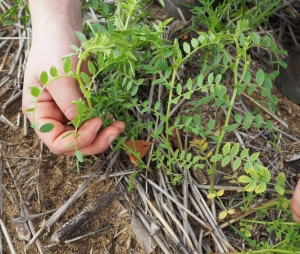Demonstration trials put ‘double break’ to the test
Demonstration trials put ‘double break’ to the test
Author: media@grdc.com.au | Date: 24 Apr 2020

Farm-scale trials are underway to demonstrate to Western Australian grain growers the potential to increase profitability by employing a ‘double break’, where two break crops are grown consecutively in the cropping rotation.
Grower organisation the West Midlands Group (WMG) is leading the project in medium rainfall areas of Western Australia’s central grainbelt as part of a new Grains Research and Development Corporation (GRDC) investment.
GRDC grower relations manager – west, Lizzie von Perger, said the benefits of a break crop – a non-cereal crop sown to provide diversity to help reduce disease, weed and pest levels in a paddock – were well known.
“The advantages of break crops include decreased input costs and greater productivity of the following cereal crops through an increase in available soil nitrogen, increased herbicide control options and decreased disease pressure,” Ms von Perger said.
“A ‘double break’ rotation is not common practice in WA, however, due to concerns about lower or variable profitability and the higher risk of growing break crops compared with cereals.
“But recent research in WA has suggested a well-managed ‘double break’, where one of the crops is canola and one a ‘high value’ legume, can have significant benefits and result in higher long-term profitability.
Ms von Perger said recent trials had found high value legumes, such as chickpeas and lentils, could achieve profitable grain yields of 0.8 tonnes per hectare to 2t/ha in the central grainbelt.
“At current prices of about $700 per tonne, this makes these high value legumes potentially profitable in their own right,” she said.
“However, these yields depend on management strategies such as effective weed control, that may be achieved through a preceding canola phase. Early sowing of legumes may also give a yield advantage
“The benefits of planting legumes early were demonstrated in an earlier GRDC-invested project that found chickpea and lentil crops sown in the central grainbelt at the start of April yielded 44 per cent more than crops sown at the end of May.
“The unique traits of chickpeas and lentils enable them to be sown very deep into subsoil moisture, allowing growers to capitalise on early sowing opportunities.”
Ms von Perger said the new research project would include demonstration sites and collate local information for a gross margin analysis.
The four demonstration sites near Latham, Dandaragan, Bruce Rock and Cuballing are being established by the WMG in collaboration with the Liebe Group, the Corrigin Farm Improvement Group and the Facey Group.
This is the first year of the trials, with the high value legumes being sown into 2019 canola stubble, at two times of sowing. In 2021 the sites will be seeded to a cereal crop.
WMG executive officer Nathan Craig said his group had found that chickpeas and lentils – currently not commonly grown in WA – could be profitably grown on soil types not considered suitable in the past.
“For example, chickpeas were traditionally grown on the State’s heavier soil types, while we have found they can also be successful on sandier soils,” Dr Craig said.
“Improved soil amelioration practices – particularly liming to increase soil pH – are likely to have played a role in expanding the soil types on which these crops can be profitably produced.”
Dr Craig said a barrier to chickpea and lentil uptake in WA was the perception that weed control was an issue.
“Pulses such as chickpeas and lentils have a different herbicide package compared with more common break crop species, and we need to learn how to better use these options,” he said.
“Growing chickpeas and lentils after canola is a great ‘backstop’ to ensure effective weed control.
“We are trying to find new crop rotation options that are as effective and profitable as traditional rotations that rely heavily on cereals.”
Contact Details
For Interviews
Lizzie von Perger, GRDC grower relations manager – west
0436 665 362
elizabeth.vonperger@grdc.com.au
Nathan Craig, West Midlands Group executive officer
0438 924 208
eo@wmgroup.org.au
Contact
media@grdc.com.au – West
0427 189 827
media@grdc.com.au
GRDC Project Code: WMG2003-001SAX,
